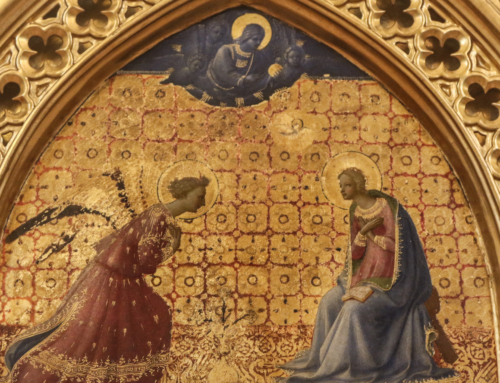At the end of Eucharistic Adoration, the presider prays, “O God, who in this wonderful sacrament have left us a memorial of your Passion, grant us, we pray, so to revere the sacred mysteries of your Body and Blood that we may constantly experience within our lives the fruits of your redemption, who live and reign for ever and ever.”
As we approach the Solemnity of All Saints and the annual Vigil hosted every year at the House of Studies—whose theme this year is “O Sacred Banquet”—we are reminded of this collect in which we ask God for a kind of favor. This isn’t an ordinary request. We’re not asking God to help us get an A on an exam, or to alleviate the traffic on our drive home. No, when the presider prays this collect, he is asking for something much more profound, and yet something that we might miss if we’re not paying close attention to the words.
In this prayer—written by our brother, Saint Thomas Aquinas for the liturgy of Corpus Christi—we ask that Jesus himself, God-made-man, grant us the grace always to experience the fruits of his redemption. In other words, by reverencing his Body and Blood—the real presence of the immortal and eternal God—in the monstrance, we seek to experience the great fruits that he won for us by dying on the Cross. What are those fruits? The indwelling of the Blessed Trinity, communion with the Church, a defense against sin, and on and on; in short, heaven on earth. Heavenly beatitude in exchange for our love and adoration. That’s quite a deal!
We are praying for nothing less than the constant, never-ending experience of eternal happiness. Only God can initiate and bestow this. Drawn by him, we then open up our hearts to his life-changing grace. “Help me,” we each ask him. He answers with the grace of a complete, total, and continuous conversion of our lives. When we kneel at adoration and commune with our God, it changes us. Truly, it changes us.
That’s what adoration of the Blessed Sacrament has the power to do. It brings us closer to Christ so that he can become and remain for us the sweetest of all sweetnesses, the one who alone can satisfy the deepest, most intimate longings of our very souls. And by adoring him and remaining disposed to receive his grace, this special moment with God helps us to become more like him.
When we pray this prayer, we are reminded of the transforming power of God’s grace. In that transformation, we constantly turn ourselves toward Christ, heeding his words in the Gospel of John, “If you love me, keep my commandments” (Jn 14:15). Turning toward Christ means staring up at him on the Cross, looking into his eyes and saying, “I will follow you.” It means flying from temptation whenever it creeps into our lives, threatening to pull us away from him. It means receiving the strength to make the Kingdom of God a reality on earth.
It is the real presence of Christ in the Eucharist that directs our lives and is the source of the fruit for which we pray. The bread from heaven, which alone contains all sweetness, is worthy of our reverence. Giving ourselves over to this reverence completely and earnestly lets us forever experience the fruit that is eternal life with him. Let us now turn toward Jesus in the Blessed Sacrament so that, at the end of our earthly lives, we might always remain with him, staring into his eyes, praising and loving him forever.
✠
Photo by The Dominican Sisters of St. Cecilia (used with permission)







